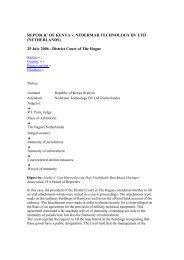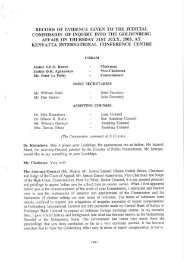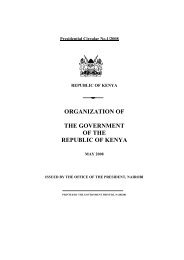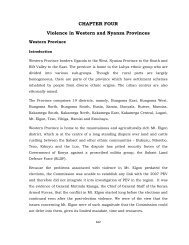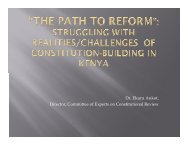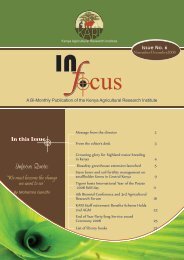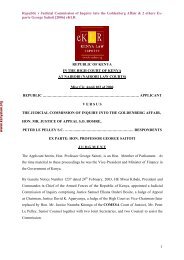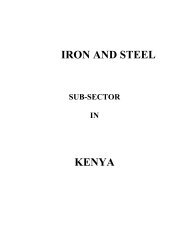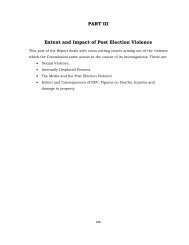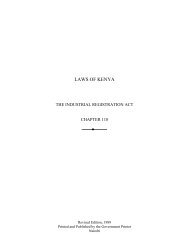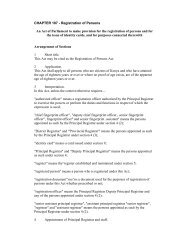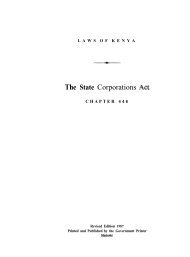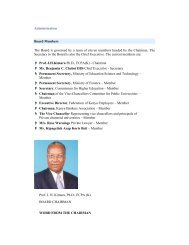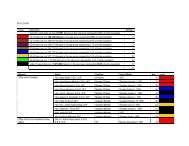- Page 1: REPUBLIC OF KENYA REPORT OF THE JUD
- Page 4 and 5: APPENDIXES APPENDIX A - GAZETTE NOT
- Page 6: WB - World Bank
- Page 10 and 11: [A] CITATION INTRODUCTION 1. By Gaz
- Page 12 and 13: (ii) whether any or all the money w
- Page 14 and 15: Nairobi. Thereafter, the sessions o
- Page 16 and 17: must consider why the courts initia
- Page 18 and 19: available to testify, he was not pr
- Page 20 and 21: documents and other exhibits produc
- Page 22 and 23: Code, in exercise of his powers und
- Page 24 and 25: 23. And we did carry on, but not fo
- Page 26 and 27: we deal with administrative matters
- Page 28 and 29: was an International Women Aids Con
- Page 30 and 31: themselves of the discretionary pow
- Page 32 and 33: so, with tremendous respect to them
- Page 34 and 35: These are some of the reasons norma
- Page 36 and 37: each. The Memorandum and Articles o
- Page 38 and 39: 55. Since the regulations allowed i
- Page 40 and 41: CHAPTER I ECONOMIC AND POLITICAL SI
- Page 44 and 45: promoting prudent macroeconomic pol
- Page 46 and 47: confirmed and irrevocable letters o
- Page 48 and 49: application, discussed it before th
- Page 50 and 51: compensation. Secondly, that it be
- Page 52 and 53: Hezekiah Oyugi, who was then a Perm
- Page 54 and 55: CHAPTER II ACCEPTANCE AND IMPLEMENT
- Page 56 and 57: letter itself upon which the Minist
- Page 58 and 59: 1) The granting of Sole rights to e
- Page 60 and 61: Sign. (C.S. Mbindyo) 28 th January,
- Page 62 and 63: 2. Folio 42/1 V.P. approves except
- Page 64 and 65: we consider the cost which is much
- Page 66 and 67: As the addressee, references and da
- Page 68 and 69: 123. It was the duty of the exporte
- Page 70 and 71: licence which was issued by the Dep
- Page 72 and 73: (ii) Procedure for Export of Eligib
- Page 74 and 75: included its terms in its agreement
- Page 76 and 77: that publication nor had he ever he
- Page 78 and 79: innocent inquirer into the existenc
- Page 80 and 81: 147. It is of interest that Pattni
- Page 82 and 83: 153. Paragraph (e) of the same noti
- Page 84 and 85: *$323,000 *$206,000 $121,000 *$179,
- Page 86 and 87: would have each time accompanied th
- Page 88 and 89: Nairobi which shall see Foreign Exc
- Page 90 and 91: would receive its purported export
- Page 92 and 93:
166. As in the case of First Americ
- Page 94 and 95:
evidence before us that GIL had ach
- Page 96 and 97:
176. When EBL was formed and grante
- Page 98 and 99:
(vii) Compensatory Payments 182. Th
- Page 100 and 101:
compensation claims each time they
- Page 102 and 103:
exported eligible goods to have bee
- Page 104 and 105:
“THE CONTROLLER M/S GOLDENBERG IN
- Page 106 and 107:
agreement with GIL, or at least rej
- Page 108 and 109:
fraudulently redesignated, initiall
- Page 110 and 111:
with the then Chief Banking Manager
- Page 112 and 113:
215. There are some discrepancies b
- Page 114 and 115:
application (Exht 155 pgs. 16 & 18)
- Page 116 and 117:
229. The facility was retired by a
- Page 118 and 119:
236. The documents produced show th
- Page 120 and 121:
244. The pre-export financing schem
- Page 122 and 123:
GIL had a retention account with Ex
- Page 124 and 125:
256. Forex Cs were to be issued by
- Page 126 and 127:
In addition Forex Cs were used to e
- Page 128 and 129:
CHAPTER IV FINANCIAL DEALINGS (A) M
- Page 130 and 131:
ehalf of either themselves, or GIL.
- Page 132 and 133:
eflect money which is unaccounted f
- Page 134 and 135:
282. Mr. Smith was referring to the
- Page 136 and 137:
exchange rate and interest from len
- Page 138 and 139:
Exchange Bank Operational Aug-92 29
- Page 140 and 141:
like Seville Investments Ltd and Du
- Page 142 and 143:
commented that certain banks were i
- Page 144 and 145:
associated organisations or account
- Page 146 and 147:
“We have remitted US$ 19 million
- Page 148 and 149:
e on the same day or within 48 hour
- Page 150 and 151:
the same day. This contract was rev
- Page 152 and 153:
our account at the Federal Reserve
- Page 154 and 155:
dates. It is also very clear that M
- Page 156 and 157:
Discussed with Manager Foreign Depa
- Page 158 and 159:
356. On the other side it is clear
- Page 160 and 161:
This is the background of the agree
- Page 162 and 163:
Wanjihia, and to do so without thei
- Page 164 and 165:
of the fact that EBL had placed no
- Page 166 and 167:
The governor appeared not to be awa
- Page 168 and 169:
Permanent Secretary is not the acco
- Page 170 and 171:
him time to find a way round the pr
- Page 172 and 173:
395. The English revolution of the
- Page 174 and 175:
it, it would have been extremely un
- Page 176 and 177:
410. Omo bills were sold by auction
- Page 178 and 179:
Later still the witness said: “My
- Page 180 and 181:
from the then governor of CBK, Mr.
- Page 182 and 183:
425. In conclusion, we think that t
- Page 184 and 185:
Gama Rose and S.B.R. Shah. On 21 st
- Page 186 and 187:
438. The letters of credit issued b
- Page 188 and 189:
lend money (Banking Act, Section 10
- Page 190 and 191:
“We refer to the above matters an
- Page 192 and 193:
March, 1993 and payments were made
- Page 194 and 195:
468. On 30 th March, 1993 a sum of
- Page 196 and 197:
them. The actual exhibit referred t
- Page 198 and 199:
y Mr. Kulei has not been provided a
- Page 200 and 201:
Kanyotu received GIL funds which th
- Page 202 and 203:
commercial and social relationship.
- Page 204 and 205:
503. The late Hon. Jaramogi Oginga
- Page 206 and 207:
509. He was served with an adverse
- Page 208 and 209:
ooks or there is no recall on their
- Page 210 and 211:
Name Shearson Lehman Bros London Ac
- Page 212 and 213:
525. The Controller and Auditor Gen
- Page 214 and 215:
531. Sometimes in or about May 1993
- Page 216 and 217:
een achieved by them. Be that as it
- Page 218 and 219:
earned the country well over Kshs.2
- Page 220 and 221:
exported when in fact that was not
- Page 222 and 223:
of Kshs.2.6 million by GIL allegedl
- Page 224 and 225:
The payment was administratively re
- Page 226 and 227:
compensation. The witness further s
- Page 228 and 229:
prompting of the former President.
- Page 230 and 231:
intelligence officer, he inquired a
- Page 232 and 233:
and therefore who would advise on t
- Page 234 and 235:
arguing that the company earned the
- Page 236 and 237:
Mr. Charles Mbindyo 590. It should
- Page 238 and 239:
the former President to make paymen
- Page 240 and 241:
Pattni. Dr. Koinange used the same
- Page 242 and 243:
latter having admitted that he is t
- Page 244 and 245:
608. Mr. Mulili was the Deputy Comm
- Page 246 and 247:
left this country. Apart from Mr. P
- Page 248 and 249:
egardless of whether they were prop
- Page 250 and 251:
625. Mr. Riungu was also involved w
- Page 252 and 253:
1993 but it wasn’t effected. Mr.
- Page 254 and 255:
Shs.2 billion, and also that the St
- Page 256 and 257:
643. The evidence before us shows t
- Page 258 and 259:
evidence is that Mr. Kotut avoided
- Page 260 and 261:
652. We heard Dr. Koinange, Mr. Wer
- Page 262 and 263:
keep the documents “for my own pr
- Page 264 and 265:
counsel, Mr. Bowry, did cross-exami
- Page 266 and 267:
674. He was the General Manager of
- Page 268 and 269:
681. Mr. Wanjihia was also involved
- Page 270 and 271:
688. It was he who should have reve
- Page 272 and 273:
was quite prepared to stand by thes
- Page 274 and 275:
707. Pattni is therefore shown conc
- Page 276 and 277:
alleged to have talked to, Mr. S.N.
- Page 278 and 279:
make any assessment as to how the a
- Page 280 and 281:
us as printing money. Professor Rya
- Page 282 and 283:
public funds in debt servicing at t
- Page 284 and 285:
(3) Effects on Government Instituti
- Page 286 and 287:
e used to influence the propriety o
- Page 288 and 289:
Njoroge testified that Prof. Mbithi
- Page 290 and 291:
to the Government of Kenya. (3) The
- Page 292 and 293:
766. But even before such prosecuti
- Page 294 and 295:
This is the case in which Job Kilac
- Page 296 and 297:
775. Despite the misleading appeara
- Page 298 and 299:
however to enable us to state with
- Page 300 and 301:
13. HCCC29/95 Uhuru highway Develop
- Page 302 and 303:
39. HCCC669/03 Kenya Commercial Ban
- Page 304 and 305:
791. Besides tax cases Mr. Pattni a
- Page 306 and 307:
800. Mr. Kirira is of the opinion t
- Page 308 and 309:
809. It is not therefore at all lik
- Page 310 and 311:
efore us for 18 days. This has been
- Page 312 and 313:
822. At the time with which we are
- Page 314 and 315:
undesirable political influence may
- Page 316 and 317:
836. The Controller and Auditor-Gen
- Page 318 and 319:
international attempts to deal with
- Page 320 and 321:
Notes: through EBL (Exht. 141 pg. 2
- Page 323 and 324:
APPENDIX “A”
- Page 325 and 326:
APPENDIX “C” TEXT OPENING SESSI
- Page 327 and 328:
een fulfilled. This became the subj
- Page 329 and 330:
1.1.1.1.2 APPENDIX “E” 1.2 TEXT
- Page 331 and 332:
GAZETTE NOTICE NO. 1566 THE COMMISS
- Page 333 and 334:
184. HON. SHARRIF NASSIR 185. MR. K
- Page 335 and 336:
DAWA 578. HUSSEN MURSALE 579. ALICE
- Page 337 and 338:
973. NJAGI NANCY WAMBUGU 974. IRERI
- Page 339 and 340:
1369. REUBEN KITHITU 1370. GIRIARI
- Page 341 and 342:
9 10 11 MUKURIA, INSP. JAMES GITAU-
- Page 343 and 344:
19 20 MAGARI, MR. JOSEPH MBUI (Perm
- Page 345 and 346:
21 22 23 RYAN, PROF.TERRY C.I. (Eco
- Page 347 and 348:
37 NGONZE, MRS. MIRIAM TSINGUI (Sen
- Page 349 and 350:
61 MUTUNGA, MR. MRS. BRETTA NDULULU
- Page 351 and 352:
71 NJOROGE, MR. H.H. (Retired CBK e
- Page 353 and 354:
77 AURA, MRS. ANTONINA (Retired emp
- Page 355 and 356:
1.3 APPENDIX “I” LIST OF WITNES
- Page 357 and 358:
2 SUNKULI, MRS. ZILPAH EMMA NTEMEL
- Page 359 and 360:
2 EX-PARTE ) HONOURABLE JACKSON MWA
- Page 361 and 362:
closes its pulic hearings the corre
- Page 363 and 364:
Order 53 rule 2 which prescribes th
- Page 365 and 366:
Similarly rule (i) is also in direc
- Page 367:
APPENDIX “K” RULING OF COURT OF
- Page 370 and 371:
720655 D7/009/92 71,635,000 25-Jun-
- Page 372 and 373:
709538 G5/017/92 42,806,263 06-Feb-
- Page 374 and 375:
2.1.1.1 APPENDIX “M” (i) Cheque
- Page 376 and 377:
to be short-term as the forex trans
- Page 378 and 379:
28 Waruhiu & Muite Advocates 29 Gac
- Page 380 and 381:
109 Philip Ochieng 110 Abraham Kipt
- Page 382 and 383:
53 Silpack Industries Ltd. 54 Haide
- Page 384 and 385:
134 Khetshi Samat & Bros 135 Reliab
- Page 386 and 387:
214 Inder Singh 215 Olivia Ndangire
- Page 388 and 389:
295 Sherali Kassam Jiwa 296 B.S. Sh
- Page 390:
APPENDIX “P” FINANCIAL GRAPHS



